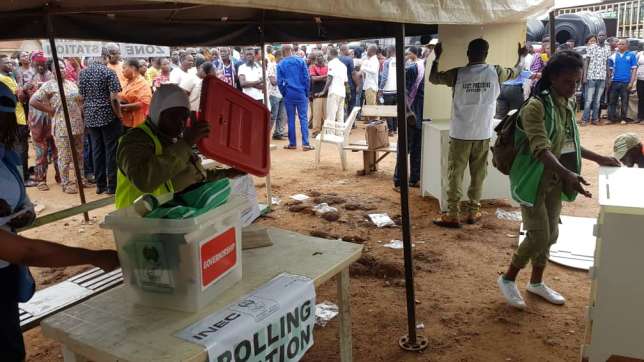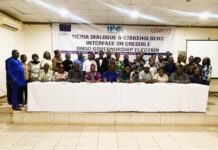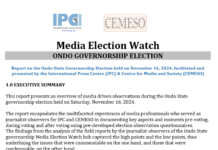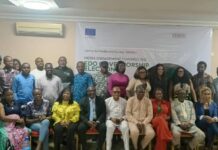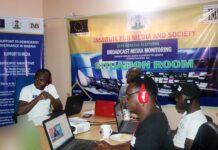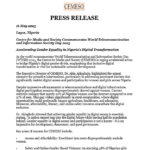Those elections have now become a litmus test as to whether this time we applied a credible process in order to actualize the incredible gift we embraced four years ago. It is an assessment as to whether we took two steps forward in 2015 and four steps back in 2019.
Democracy is an incredible gift. It is a political system that requires a popular vote to take place in order to elect the leader of a country and other officials. If practiced properly, this incredible gift can promote change, foster equality, protect people’s interest, amongst so many other benefits for the citizens. It can be incredible. However, if this incredible gift is not utilized in the proper manner, if it is applied with recklessness and a state of impunity, it can instigate corruption, may involve immoral practices during elections, it might even allow the misuse of public funds, together with so many other disadvantages for a nation. In this instance, it can be uncredible. The main tenet of this incredible gift is the conduct of credible elections.
Since the historic, peaceful, democratic transition of power to the opposition in 2015, when the then incumbent President Goodluck Jonathan of the PDP conceded defeat to General Muhammudu Buhari of the APC, national elections were just recently held in Nigeria. Those elections have now become a litmus test as to whether this time we applied a credible process in order to actualize the incredible gift we embraced four years ago. It is an assessment as to whether we took two steps forward in 2015 and four steps back in 2019.
No matter which side of the divide one is on, one must admit that the 2019 elections revealed serious shortcomings in the legal and institutional framework of Nigeria’s electoral system. If we yearn to clean up the electoral process, there’s no time to waste in ensuring fundamental reforms are made. The country is still suffering from what, I call, Post-Election-Syndrome, whereby the victors’ vociferous jubilation taunts the losers as they head to the courts seeking redress.
While the elections may have not been seen as a total disaster, many infractions during the process need to be pointed out, particularly in the gubernatorial elections.In those instances, the elections revealed the weak and partisan structure of the Election Commission in charge of the overall management of electoral process, and gaps in the Electoral Code and Constitution. In the elections, there were high levels of abuse of human rights. Official impunity characterized the process in many places. Interested parties worked overtime to manipulate the electoral system in order to remain in power.
The desperation exhibited by both the incumbent and the opposition to get the result in theirfavor, by all means, was indeed appalling. Desperate and do-or-die politicians were quick to deploy every trick they had in their kitty to influence electorates, thus disrupting the peaceful conduct of the elections. Armed soldiers were deployed in violation of several subsisting court judgments from prior elections. In many instances, the political class remained resolute in making a mockery of our electoral process. During the exercise, the electoral guidelines was set aside going by the level of intimidation of the electorates. Some local observers, as well as journalists, have gory tales to tell about their experiences during the elections – the culprits were from both sides of the divide.
Reports had it that the Kano supplementary elections were rather volatile as politicians unashamedly deployed their thugs to force electorates to do their bidding, despite the presence of security agents. Violence did certainly punctuate the voting in several locations. There were clear instances and evidence were thugs and party agents intimidated voters into voting for particular candidates. Several observer group reports showed a lot of irregularities, harassment of voters, INEC officials and abuse of the exercise. In the particular instance of Kano, the desperation and power tussle is, most likely, not unconnected to the State’s political value and calculation ahead of the 2023 elections.
The supplementary elections in Sokoto and Plateau recorded little incidents but were marred by issues of underage voting and voter inducement. While INEC has continually reiterated that underage voting is illegal, the act still flourishes. Underage voting has been a major issue in Nigeria’s political discourse since the return of democratic government in 1999. This conundrum, which successive governments have not been able to solve has thwarted the beauty of the incredible gift in the country.
Voter inducement was another major flaw of the 2019 elections. Voters were induced through engraving of pictures of candidates and political party logos on gift items during elections. And then there was the rampant strategy of covert vote buying. The gubernatorial elections in some states, where vote buying greatly influenced the electoral process, proved that it is a major consideration for victory among politicians.
With all these reported infractions in our electoral process, the first step to overhauling the system is self-awareness. We must put aside the self-righteous hyperbole and accept that in Nigeria, we, most likely, no longer enjoy a neutral electoral process in a functioning democracy worth its name. With the way these past elections were conducted, we must face the actuality that we are slowly sliding back to our old ways, back to becoming one of those struggling developing world states that needs to claw its way slowly toward democratic integrity.
Arguably, political parties have shown that they are incapable of providing candidates that are worthy of being elected and can be elected by people, based on their credibility, and that, as political parties, they can not get to power on merit except when they lure and induce people as a way to buy their candidates into power.
All those involved in the electoral process, including the government and state institutions, the executive and legislative branches, and political parties themselves urgently need to further reach an accord on the nature and gravity of required electoral reforms needed in Nigeria. They should try to determine what should viably be done, given the political environment, and pragmatism of execution.
As a nation looking to advance and strengthen our incredible gift, we may have to seriously consider whether there should be a new type of INEC; possibly one that is entirely technical, or a peripheral mechanism with organic roles and arrangement that would assure political actors.
Aside from these intervening obstacles, the serious lack of trust amid the several actors in the electoral process, such as the civil society, the political parties, the citizens and the electoral commission must be addressed. All parties have to be ready to put aside bias and partisanship in order to attain the overhaul that may be needed to give INEC the Colonic rinse it needs.
It’s really a no brainer; in order to make our elections more credible, the Electoral Reforms Panels headed by Retired Justice Mohammed Uwais, Sheik Ahmed Lemu and Dr. Ken Nnamani respectively needs to be fully and thoroughly implemented for the country to have flawless elections in future. The Uwais panel was set up by the late President Umaru Yaradu’a and came up with a number of recommendations to improve the electoral process. In 2011, the Lemu Panel was set up by President Goodluck Jonathan and it reiterated the recommendations of the Uwais Panel and made further recommendations. In 2015, President Muhammadu Buhari set up the Ken Nnamani Panel on electoral reports. That Panel studied the recommendations of the panels that came before it and also reiterated the recommendations and made further recommendations. However, all the recommendations have been put aside by all the parties during their time.
The 2008 Uwais report recommends establishing commissions to deal with Electoral Offences, Constituency Delimitation and Political Parties Registration and Regulation. Some of the power vested in the Independent National Electoral Commission (INEC) and the State Independent Electoral Commissions would be transferred to the new commissions. It further recommended proportional representation in elections to the Federal and State legislatures and to the local government councils. The report also recommends the head of the Independent National Electoral Commission should be appointed by the judiciary, rather than the President.
There have been and still are many calls by different groups, individuals and association for the adoption of this report. As it stands, INEC has too many tasks on hand, ranging from voter registration, monitoring of political activities to printing of materials and conducting elections. There is a need for the establishment of other commissions to perform the different tasks in such manner that they would ensure effectiveness and efficiency, leaving INEC to function optimally with fewer tasks.
The primary responsibility of this much needed reform lies with the government and the legislature, although civil society can inform public opinion and guide politicians, who are otherwise too preoccupied with their partisan interests, away from driving the process to a stalemate.
Moving forward, it is paramount for us to ensure that future elections are carried out in a free, fair, transparent and credible manner. This would mean implementing an environment of trust, which can be facilitated through the application of some of the measures suggested above.
The factors that resulted in inconclusive elections such as violence, vote buying, over voting, underage voting, and cancellation have clearly repeated themselves in these past elections. Sadly, the factors became worse due to the desperation of politicians who turned elections into a do or die affair. There is need for a serious national conversation on critical areas of improvement in the conduct of elections in Nigeria. A revisit to the Justice Uwais electoral reform has become quite essential.
Democracy’s incredible gift is meant to provide an enabling environment for everyone to feel safe. It is supposed to be a tool where leaders are elected credibly. If we allow our process to be uncredible, we will not enjoy its gift, because, for our democracy to be incredible, our elections must be credible.


